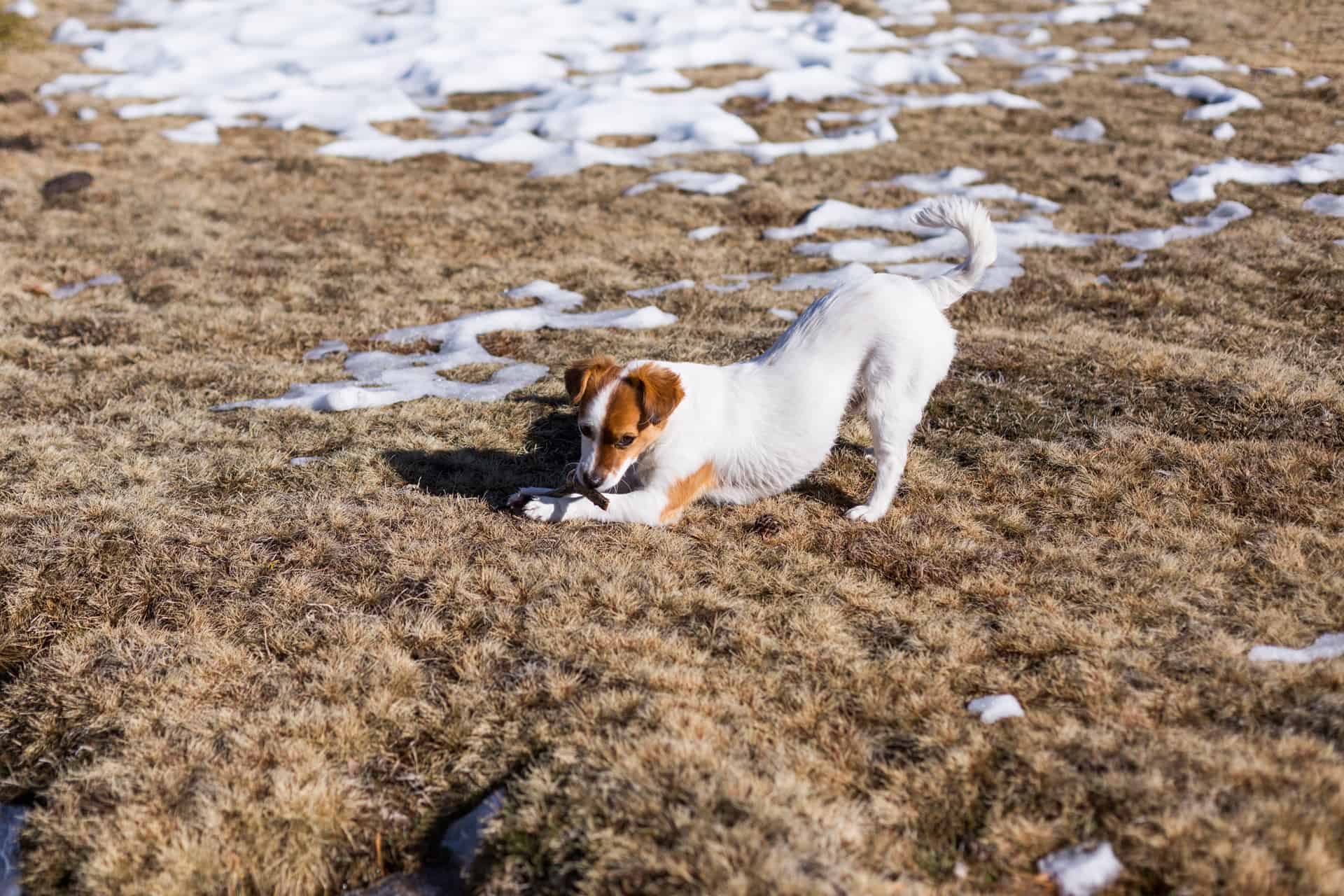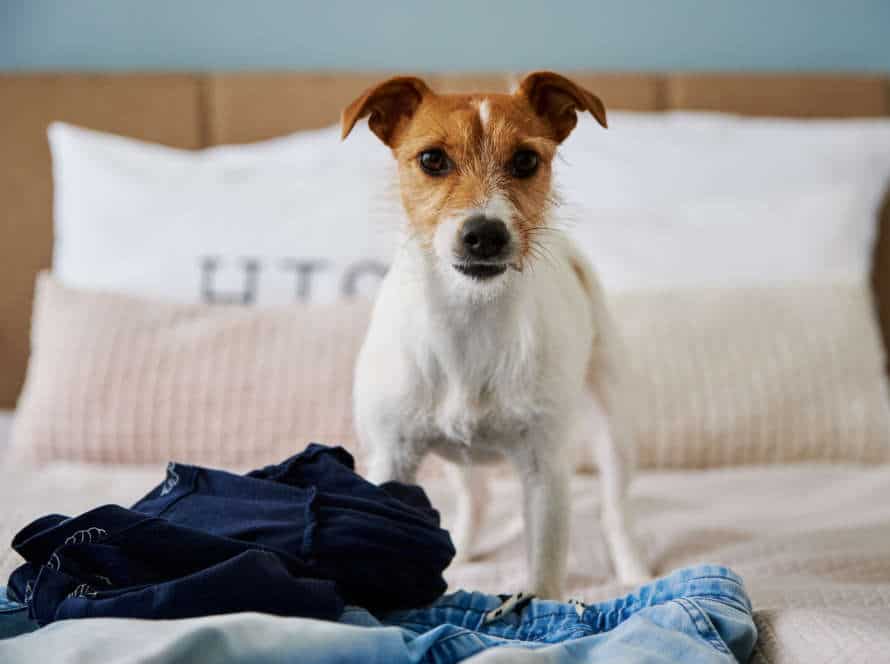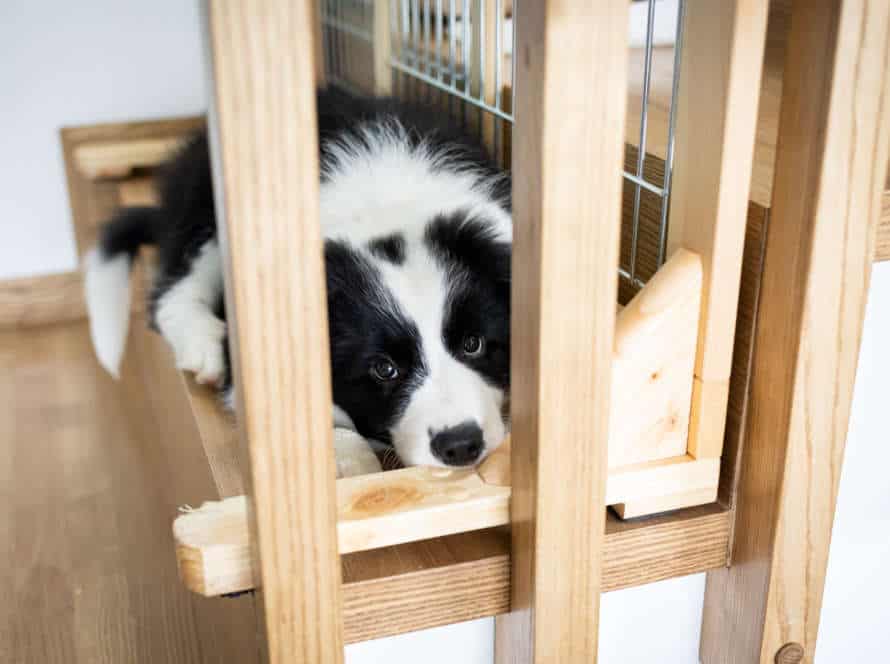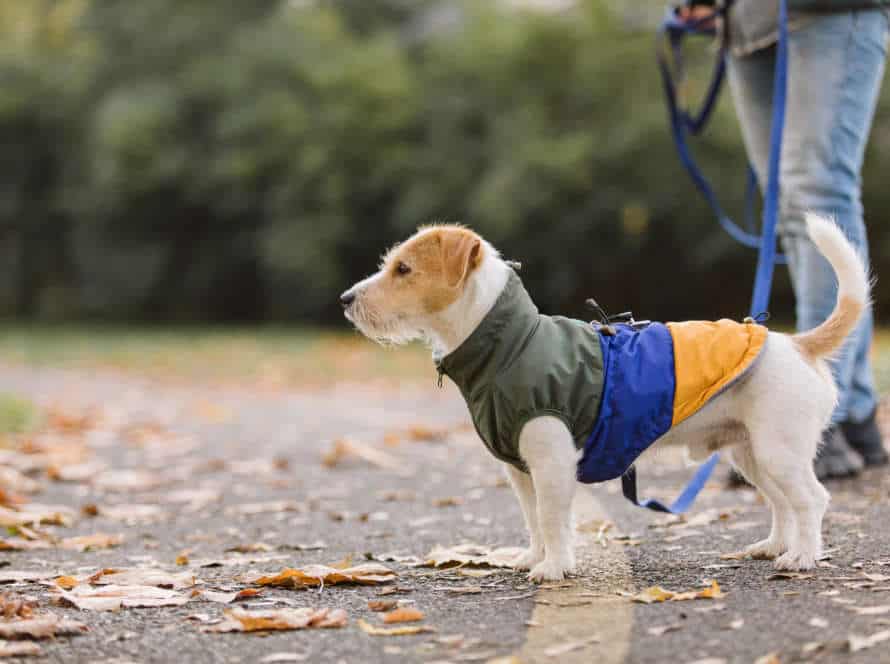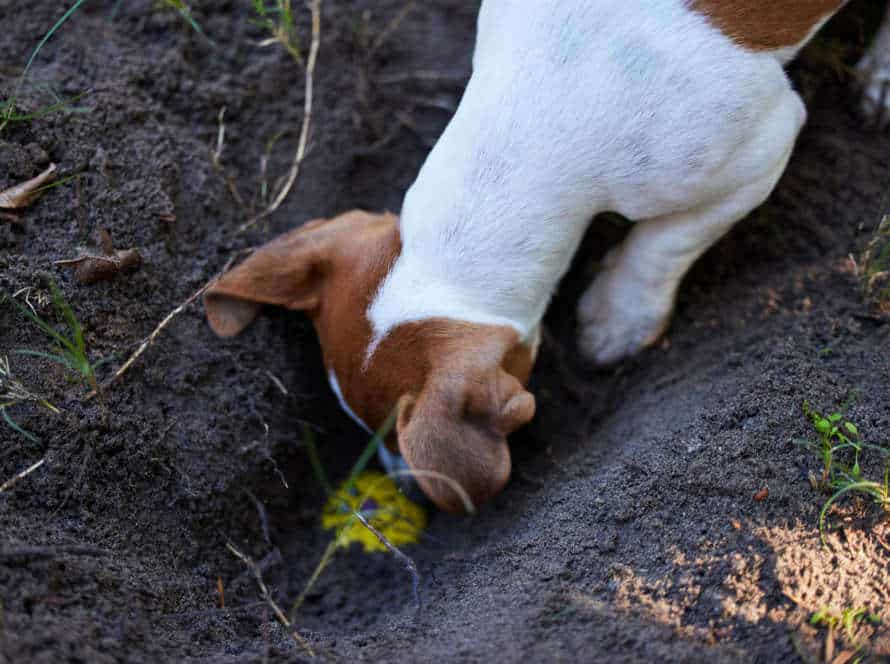Establishing a Consistent Routine to Minimize Digging in Puppies
Creating a regular routine can help minimize digging in puppies. Make a plan with exercise, playtime, meals and potty breaks. Here’s some tips:
- Set a feeding schedule, and always have water available.
- Agree on a bedtime and waking time.
- Allow for both indoor and outdoor playtime to keep your pup entertained.
- Take them out for potty breaks often, and watch them while they’re outside to stop digging.
Sticking to a routine can help your puppy adjust to their new home and cut down on digging.
Understanding Your Puppy’s Impulse to Dig
Puppies have an instinct to dig. To train them better, it helps to understand this impulse. Establishing a consistent routine and setting boundaries is key. This will show the pup what is acceptable. Want to know how? Let’s explore!
Reasons why puppies dig
Puppies often dig, and there’s a few reasons why. Understand these reasons to help reduce your pup’s digging.
Here’s why puppies dig:
- Boredom – Puppies have lots of energy. If they don’t have an outlet, they might start digging to relieve the boredom.
- Temperature – They may dig a hole to cool off from the heat or stay warm in the cold.
- Hunting – Pups have a natural instinct to dig and hunt for prey. This behaviour can be intensified if they catch a scent.
You can minimise your pup’s urge to dig by establishing a consistent routine full of exercise, playtime, and mental stimulation. You could even provide a designated digging area like a sandbox or patch of soil to redirect their digging.
Signs of digging behavior to look out for
Digging is a natural instinct for puppies. Dog owners should know the signs of this behavior. Here are some to look out for:
- Dilated pupils, perked up ears, and rooting or scratching the ground.
- Digging happens when a pup is left alone or bored.
- New holes in the yard near fences or flower beds.
To control digging, make a consistent routine. This includes a daily walk and playtime. Give your pup designated digging areas like sandboxes or parts of the yard.
Pro tip: Positive reinforcement works! Use treats, praise, and toys to reward good behavior.
Consequences of digging if not addressed
Digging is a natural behavior for puppies. But, if not addressed correctly, it can have serious consequences. For example:
- Destruction of Property – Digging can damage your lawn, garden and even your property’s foundations.
- Injury to Paws – Sharp objects in the dirt can lead to cuts and punctures on your puppy’s paws.
- Escaping and Getting Lost – Puppies can dig holes to escape their confined area and may get lost or injured.
- Increased Digging Habits – Without guidance, puppies are likely to keep digging, creating more problems and making the habit hard to break.
To avoid these consequences, create a consistent routine. This should include:
- Plenty of exercise and playtime.
- Supervision during outdoor activity.
- Positive reinforcement when your puppy behaves correctly.
Pro Tip: Designate a specific area in your yard for your puppy to dig, then reward them when they use it.
Creating a Safe and Comfortable Space for Your Puppy
Raising a pup? Essential! Create a secure space for them. Have a routine; keep the same schedule. Establish house rules and introduce items like a crate and toys. This routine minimizes naughty behaviour and makes a calm home. A consistent routine helps the pup feel secure and comfortable in their new pad.
Designate a digging area for your puppy
Designing a digging area for your puppy can help create a routine that stops their digging habits.
Take these steps to make a special area for your pup:
- Pick a spot in your garden that’s easy to get to, and away from plants or buildings.
- Border the area with something like a raised garden bed.
- Fill the area with soil or sand to make it easier for your pup to dig.
- Encourage them to try it out by burying toys or treats in the soil.
- If they try to dig somewhere else, kindly move them to the designated area.
With consistent support, your pup will learn where it’s okay to dig, and where it’s not.
Issue toys and play items to keep your puppy stimulated
Toys and play items are essential for keeping your pup stimulated and busy. Plus, they provide an outlet for all that energy which helps to stop them from digging. Here are some tips to keep them entertained and stop them from digging:
- Issue safe, non-toxic toys that they’ll find interesting.
- Switch up the toys regularly so they don’t get bored.
- Think about puzzles or interactive toys that give them treats.
- Set up a routine for when it’s time to play.
- Don’t forget that enough attention and playtime can help to stop destructive behaviour.
Establish boundaries for your puppy
Establishing boundaries for your pup is key for a secure and cozy space for it to develop and learn. Here are some effective ways to establish boundaries:
- Crate training: Crate training is a great way to set boundaries. It helps create a familiar, relaxed area for your pup to rest and take breaks.
- Baby gates: Baby gates can be used to control your puppy’s access to different parts of the house. It’s an effective way to set boundaries and make your pup feel comfortable.
- Distraction techniques: Puppies love to dig and chew due to curiosity or boredom. Distraction techniques, like providing chew toys, mental stimulation activities, or hiding food in designated digging areas, can help redirect this behavior.
- Consistent routine: A steady routine is important for setting boundaries that will reduce your puppy’s need to dig or chew. A steady sleep, eating, and exercise schedule can help decrease these behaviors. Pro Tip – Establishing boundaries is essential for creating a pleasant environment for the new family member. Be patient and consistent in their training!
Setting a Consistent Routine for Your Puppy
Creating a routine for your pup is a must! It’ll help manage their behavior and stop them from digging. This could include times for walks, playtime, meals, and potty breaks. A routine will reduce digging and teach your pup the right behaviors. Plus, it can help ease stress and anxiety.
Here’s how to set up a consistent routine for your pup:
- Decide on a consistent time for meals. This will not only help your pup create a sense of routine but will also help with their digestion.
- Schedule walks at consistent times. If your pup knows that walks happen at certain times of the day, they’ll be less likely to get restless and dig up your yard.
- Set aside playtime every day. This will give your pup an outlet for their energy and reduce the likelihood of destructive behaviors.
- Designate areas for potty breaks. Take your pup to the same spot every time they need to go outside. This will help them learn where to go and reduce the chance of them digging in random spots.
- Be consistent with your routine. The key is to stick to a schedule. As your pup becomes accustomed to this routine, you’ll find that they’re less anxious and more well-behaved.
Scheduled walking times to reduce boredom
A walking routine for your pup is a must. It’ll reduce boredom, stop digging, and make them feel secure when you’re away. Here’s how to make it happen:
- Work out how many times to take your pup for a walk based on their age and breed.
- Set specific times and stick to them.
- Keep each walk short.
- Use the same route each time.
- Include training and play for extra fun.
And, voila, your pup will be well-behaved and happy!
Establishing a feeding schedule
Creating a feeding plan is key for setting up a regular routine for your pup and preventing digging behavior. Here are a few tips:
- Work out the perfect food amount for your pup’s age, breed and size.
- Divide total food into three or four meals a day for pups up to six months, two meals for older pups.
- Set a reliable schedule for feeding, ideally same time each day.
- Don’t leave food available all day (free-feeding) as it can lead to overeating and loose stools.
- Use feeding time for training and bonding with your pup.
- Encourage calm behavior, reward good behavior with treats and praise.
With a consistent feeding plan, your pup is less likely to get bored and start digging for fun.
Consistent sleeping routines
Creating a regular sleep routine for your pup aids in their overall health and behaviour. A puppy requires 12-14 hours of snooze time daily, and a regular routine helps them get the rest they need.
These tips will help you form a steady sleep routine for your pup:
- Choose a specific sleep spot for your pup.
- Set a bedtime and rising time that works for both you and your pup.
- Provide lots of exercise and playtime during the day to make them sleepy at bedtime.
- Avoid too much play or excitement before bedtime.
- Consistency is important: be consistent with the routine as much as you can.
By having a regular sleeping plan, you can reduce digging in puppies since they won’t be as bored or restless during their waking hours.
Training Your Puppy to Stop Digging
Training your pup to not dig is a key part of having a successful pup! Making a plan and giving lots of rewards can help your puppy make good decisions. Here are the top tips:
- Create a consistent routine.
- Offer positive reinforcement.
- Reduce the amount of digging.
Using positive reinforcement and negative association methods
Train your pup to stop digging! A combination of positive reinforcement and negative association techniques can help.
Firstly, create a consistent routine. This will reduce digging in puppies.
Then, use positive reinforcement. Give treats, toys and praise when they don’t dig in areas you’ve marked off.
Also, use negative association. Discourage digging by making an unpleasant noise, spraying water, or using a motion-activated device.
Make sure to not give too many toys or bones.
With patience, consistency and these methods, you can successfully train your pup to stop digging and avoid unwanted behavior.
Redirecting your puppy’s attention during digging behavior
Pups are famed for their curious and mischievous nature. This often leads to them digging. To train them to stop, redirecting their attention is key. Here are some tips to help:
- Give them a sandbox or a specific area in the yard to dig in.
- Supervise your pup when outside. If they start digging in an area you don’t want them to, redirect their attention with a toy or treat.
- Make sure your pup gets enough exercise and mental stimulation – this will stop boredom and destructive behavior.
- Have a regular routine for feeding, exercising and playing. This will reduce stress and anxiety.
By following these tips, you can train your pup not to dig and keep them healthy and happy.
Making changes to your dog’s environment to deter digging
If your pup has a bad case of the diggies, making changes to their environment can help deter the behavior and shift their focus. Here are some tips to customize your pup’s space and keep them from digging:
- Give them a “dig zone”: Make a special spot in your yard, like a sandbox or dirt pile, and let your pup dig there. Bury toys or treats to encourage them to use it.
- Block problem areas: Use fences or barriers to stop pup from digging in unwanted places. Cover the soil with chicken wire or mesh netting to prevent them from digging.
- Watch them: Keep an eye on your pup when they’re outside so they don’t dig up the wrong areas. Exercise and attention can also help reduce boredom which can lead to digging.
- Use deterrents: Bitter apple spray or citrus peels can be put on spots you don’t want them digging.
Remember, having a consistent routine, giving them mental stimulation and proper training can help reduce digging in puppies.
Addressing Health Concerns
Ensuring your pup lives long and healthy is a must. To minimize digging problems, set up a health routine. Understand potential health issues that come from digging and how to tackle them. This article will give an overview of health risks and strategies for setting up a routine. So, you can guarantee your puppy’s safety and health.
Behavioral changes to look out for
Puppies are so cute, but they can also be naughty and love to dig. To stop this, create a regular routine for your pup. Here are some changes to watch for:
- Digging in the garden? Could be because they’re bored or need more exercise. Make an exercise plan for your pup to keep them active and entertained.
- Chewing on stuff? Shoes, furniture, anything really! Give your pup chew toys to keep them busy and direct their chewing.
- Whining or barking? Can be from boredom, worry or wanting attention. Build a daily routine with playtime, exercise and mental stimulation to stop this.
- Plus, crates are handy to stop digging and bad behavior when you can’t watch them. Crate train your pup so they don’t get anxious or scared.
Remember, consistency is key to fixing your pup’s bad behavior. A steady routine will make them feel safe and help their behavior over time.
Potential health issues that may contribute to digging behavior
Digging in puppies can be a common problem. To tackle the issue, look into health reasons behind it. These include: allergies, boredom, or anxiety. To address the behavior, make a routine for your pup. Keep them active with toys or playtime. If allergies are the cause, see your vet. If the digging persists, get help from a pro trainer or animal behaviorist.
Pro tip: Give your pup a space just for digging – this can help them satisfy their urge to dig.
Consulting with a veterinarian on your puppy’s behavior
If your pup digs, it’s important to chat with a vet. This is to make sure there’s nothing wrong with them. Once all is clear, having a routine can help stop the digging. Here are some tips:
- Make sure your pup gets enough exercise and mental stimulation. No exercise and boredom can cause digging.
- Create an area in the yard for the pup to dig.
- Positive reinforcement training techniques can help with desired behaviour.
- Redirect attention and focus with puzzles, toys and games.
- Be consistent with the routine.
Remember: Dogs dig naturally, so be understanding.
Conclusion
So, for puppies, having a routine is key. It can reduce their digging. Get them doing activities and provide distractions. Give ’em rewards for good behavior. And know why they’re digging. That’s crucial for solving the issue.
Recap of main points
To reduce digging in puppies, having a fixed routine is key. A few important steps to remember:
- Make a special spot where your puppy can dig and reward them when they use it.
- Keep an eye on your puppy and give them lots of activity to avoid boredom.
- Use positive reinforcement training to move your pup away when they start to dig in the wrong areas.
- React the same way to your pup’s behavior and don’t reward digging in off-limits areas.
By following these tips, you can help your pup form good habits and reduce unwanted digging.
Importance of consistency in addressing digging behavior
To deal with digging behavior in puppies, a consistent routine is essential. This helps them understand what is and isn’t allowed. Here’s how you can create a routine to stop digging:
- Set up a spot where your pup can dig. Train them to only do it there.
- Supervise when they’re outside and redirect them if they start digging elsewhere.
- Offer exercise and mental stimulation to reduce the desire to dig.
- Reinforce good behavior with treats, praise and playtime.
- Be patient and consistent with training. Change takes time, but with an established routine, you can minimize digging over time.
Final words of advice for puppy owners
In the end, setting up a regular routine is the way to go to lower your pup’s digging. Remember: they dig for many different causes, such as boredom, interest, nervousness, or an inherent desire to hide things.
Here’s some last-minute advice:
- Supply your puppy with enough activity and playtime to avoid laziness and tension.
- Train your pup with positive reinforcement tactics, rewarding good conduct and rerouting bad behaviour.
- Make a set area for your puppy to dig and persuade them to use it.
- When your puppy is outside, keep watch and distract them when they dig in areas that you don’t want them to.
- Use physical boundaries or natural deterrents (like lemon peels or chicken wire) to stop your pup from digging in special areas.
By following these tips and staying consistent with your pup’s schedule, you can prevent the annoyance of undesired digging and enjoy a content, healthy bond with your adorable friend.
Frequently Asked Questions
Q: Why do puppies dig?
A: Puppies may dig for various reasons, including boredom, curiosity, anxiety, lack of exercise, or a desire to escape an area.
Q: How can I establish a consistent routine for my puppy?
A: Start with a regular feeding and potty schedule, and include daily exercise and playtime. Stick to a consistent sleep schedule and train your puppy to follow simple commands.
Q: What are some ways to discourage digging in puppies?
A: Provide plenty of exercise and mental stimulation, designate specific digging areas, supervise your puppy when outdoors, and use positive reinforcement training techniques to discourage digging.
Q: What should I do if my puppy continues to dig despite my efforts?
A: Consider consulting with a professional dog trainer or behaviorist to address any underlying behavioral issues causing digging. Additionally, ensure your puppy has ample opportunities for physical and mental stimulation throughout the day.
Q: Can I punish my puppy for digging?
A: No, punishment can be ineffective and may harm the bond between you and your puppy. Instead, focus on using positive reinforcement training techniques to redirect your puppy’s behavior.
Q: How long does it take for a consistent routine to minimize digging in puppies?
A: Every puppy is different, but with patience and consistency, you can start to see results within a few weeks to a few months. Keep in mind that establishing a consistent routine may take time and effort, but it will ultimately benefit your puppy’s overall well-being and behavior.

